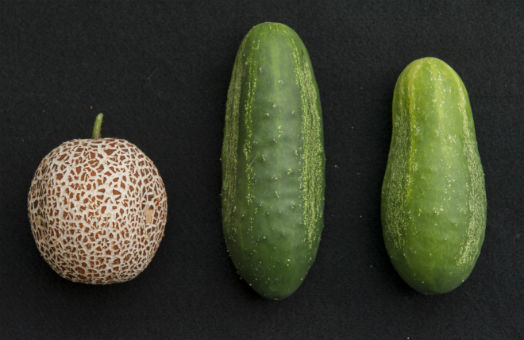Oct 11, 2016MSU scientists lead effort to help organic cucurbit growers
A team of Michigan State University (MSU) researchers will lead a project to develop new tools to help organic cucurbit growers address their most pressing needs with a nearly $1 million grant from the U.S. Department of Agriculture’s National Institute for Food and Agriculture.
Cucurbits, the family of vegetables including cucumbers, watermelons, pumpkins, zucchini and gourds, rank among the top five organically produced vegetable crops in the country. Controlling pests, diseases and weeds, and managing crop nutrients are among the most important concerns of organic cucurbit growers.
Zsofia Szendrei, MSU AgBioResearch entomologist and associate professor in the Department of Entomology, is leading a team of research and extension experts from MSU, Purdue and the University of Wisconsin, which will be advised by a panel of growers. The three-year project aims to produce an integrated production system that enhances farm profitability while reducing environmental risks.
“Organic agriculture has expanded at a phenomenal rate in the past five to 10 years,” Szendrei said. “There’s been a major boom in the number of acres and the economic value of organic crops, but our knowledge base of organic agriculture practices has not kept pace with that expansion. We are trying to improve our understanding and provide growers with the best science-based tools and strategies.”
The team will investigate a variety of aspects of cucurbit production identified as priorities by growers in a 2016 survey. These include better weed, disease and pest management, particularly related to cucumber beetle, downy mildew and Phytophthora; and reduced tillage practices, cover crops, nitrogen management and pollination.
Rather than conducting separate experiments in each of these subject areas, the research will take an integrated systems approach.
“Since organic agriculture relies so much less on pesticides, growers must rely on ecological farming methods,” Szendrei explained. “Under that model, every part of the farming process impacts everything else. You cannot study diseases, insect pests or nutrient management in isolation – you have to see the big picture.”
The project will address the prevalence and diversity of pollinators in cucurbit production. Through a partnership with the MSU Master Gardener volunteer program, volunteers will employ citizen science techniques to gauge the bee populations in cucurbit plots. After training on identifying various bee species, Master Gardener participants will visit farms and estimate populations of honeybees, bumblebees and the lesser known squash bees.
One of the key project areas is focused on helping growers integrate cover crops into their practices as a way to protect squash by creating a leafy barrier between them and the ground, thus preventing them from being covered in moisture and succumbing to rot. Squash bees, however, are ground-nesting insects. Szendrei wants to find out if the addition of cover crops to the agricultural landscape will affect squash bees in particular.
Szendrei said she hopes to produce a comprehensive management program to help growers handle a variety of circumstances. The team will partner with growers throughout the region to test the methods in on-farm settings.
“We need to take advantage of both the techniques of modern science and the ingenuity of our growers to solve these problems,” Szendrei said. “Having their advice and guidance gives our project a greater degree of adaptability that will ensure that our findings remain relevant to growers around the region.”
To learn more, visit the On-Campus MSU Research website.
— Holly Whetstone, Michigan State University
Source: Michigan State University AgBioResearch















